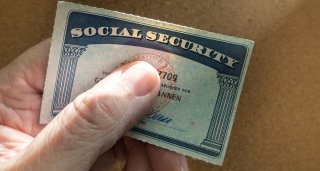How to Keep Your Social Security Number Secure
How can people protect their Social Security numbers, especially in a world in which Social Security numbers often must be shared? Here's some advice.
The federal government frequently announces the arrest, conviction or guilty pleas of people who stole Social Security numbers or otherwise committed Social Security-related fraud.
How can people protect their Social Security numbers, especially in a world in which Social Security numbers often must be shared? The AARP recently shared some advice.
In an article published this week on AARP’s Personal Technology page, the AARP’s Edward C. Baig looked at how people can protect that important number.
Social Security numbers should be kept close to the vest, along with credit card numbers, driver’s license, tax forms, and other documents that could help criminals steal your identity or money.
Channeling Ronald Reagan, the AARP suggests that Social Security cardholders “trust, but verify” those asking for their information.
“Be extremely wary of providing your Social Security number to someone who has called you. You should verify the identity of the person you are speaking with if you didn't reach out directly,” the AARP article says. “Just don't do so by calling back a provided phone number or clicking on a text link. Moreover, unless the answer is obvious—the accountant you've been using for years to prepare your tax returns—ask a would-be recipient why they want the information in the first place and how they intend to secure it. Also ask what will happen if you decline to give out the information.”
"Some businesses continue to use Social Security numbers as a means of authenticating customers or simply as a practice they just never let go of,” Kathy Stokes, AARP's director of fraud prevention programs and head of the AARP Fraud Watch Network, said in the article. “Consider pushing back and asking if there's an alternative.”
Users are also asked not to ever email their Social Security numbers.
“If you're satisfied the stranger you are dealing with is who they say they are and has a legitimate need for the information, the next step is to figure out how to safely provide it to them. It's often inconvenient to hand-deliver financial, tax or employment records, especially during a pandemic,” the blog post says.
“If documentation isn't required and you just need to share an ID number or some other details, you can provide the information over the phone. Again, do so only if you know the person is legitimate and trustworthy.”
You can use encrypted email if you want, but know that it is difficult.
"That's just not something most people are going to do,” Eva Velasquez, president and CEO of the nonprofit Identity Theft Resource Center in San Diego, said in the new AARP blog post.
Stephen Silver, a technology writer for The National Interest, is a journalist, essayist and film critic, who is also a contributor to The Philadelphia Inquirer, Philly Voice, Philadelphia Weekly, the Jewish Telegraphic Agency, Living Life Fearless, Backstage magazine, Broad Street Review and Splice Today. The co-founder of the Philadelphia Film Critics Circle, Stephen lives in suburban Philadelphia with his wife and two sons. Follow him on Twitter at @StephenSilver.
Image: Social Security Administration

